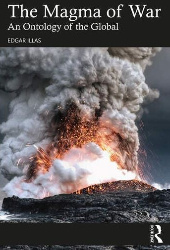War, from the conflicts in the Middle East and Russia/Ukraine to Mexican narco-violence, from neocolonial land grabs in the Global South to racial, border, health, and climate crises all over the planet, defines the most extreme and contradictory expression of the global world. In this fascinating exploration on the history of the thinking of conflict, Edgar Illas departs from military and sociological analyses to propose a theoretical exploration of war as the ontological force that produces political orders.
Magma is used as a geological metaphor to theorize the mixtures of politics and war that organize, and disorganize, global society. Divided into two parts, Illas’ study begins by surveying some of the most important thinkers of war, moving from classical antiquity to the twentieth century. Each thinker provides a different inflection in the historical evolution of the being of war. The second part turns to a theorization of the twenty-first century to claim that conflictive relations between capital, state power, political movements, and social life in globalization culminate and at the same time reiterate the paradoxes of war as an ontological event.
The Magma of War is an energizing contribution to the task of rethinking politics in relation to war and an invaluable resource to all those conscious of the unstable forms of contemporary social and political life.

 The College of Arts
The College of Arts